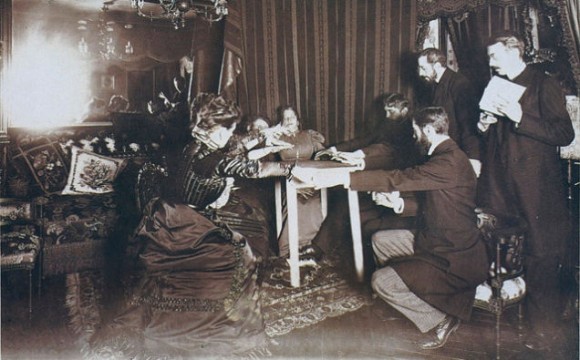Scientists throughout history unlocking the secrets of the occult…
Even science-minded folks are intrigued by the unknown. Curiosity is the realm of intelligence.
10 Famous Scientists Who Held Surprising Supernatural Beliefs
by Lauren Davis (io9.com)
While we typically hold up scientists, especially those who have made important discoveries, as paragons of rationality, numerous scientists have had fascinations with cryptids, psychic phenomena, and other aspects of the occult. And what some of these particular people believed may surprise you.
1. Sir Isaac Newton and His Belief in the Occult
It may surprise folks who are familiar only with Sir Issac Newton’s mathematical and scientific contributions that Newton was profoundly interested in the occult. Newton was a devout Anglican and an alchemist — neither of which was unusual for an English scientist in the 17th and 18th centuries. (Although many of Newton’s particular religious beliefs, particularly his anti-Trinitarianism, would have been considered heretical at the time.) Still, it’s can be difficult for some modern readers to reconcile Newton’s mathematical descriptions of the universe with his obsessions with Biblical numerology, astrology, and a quest for the Philosopher’s Stone.
Newton made no distinction between the scientific and the mystical. He believed that the world could be understood through mathematics as well as through secrets hidden in the Bible. Based on his interpretations of the Scriptures, he even estimated the date of the end of the world. (He pegged it at around 2060, although he was himself suspicious of people who thought they had the exact year down.) He thought he could divine the size of the Earth by studying the geometry of Solomon’s Temple. He conducted numerous experiments in his quest to create the fabled Philosopher’s Stone. And his work in religion and alchemy was just as detailed as his work in what we would today consider science.
There are some writers who believe that Newton made such powerful contributions to our understanding of the world not in spite of his more mystical beliefs, but because of them. His studies on optics had their foundations in alchemy. In trying to describe the behavior of the cosmos, he was trying to unlock the secrets of God’s mechanisms. He simply used whatever tools he could find: mathematics, the Bible, alchemy, and other “sciences” we would now consider occult. Some of them worked out better than others.
2. Carl Linnaeus’ Mermaids…
For the rest click here.
Share

